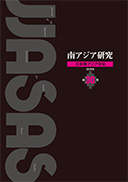Volume 2018, Issue 30
Journal of the Japanese Association for South Asian Studies
Displaying 1-17 of 17 articles from this issue
- |<
- <
- 1
- >
- >|
-
2020Volume 2018Issue 30 Pages 6-35
Published: March 31, 2020
Released on J-STAGE: September 14, 2020
Download PDF (1245K)
-
2020Volume 2018Issue 30 Pages 36-52
Published: March 31, 2020
Released on J-STAGE: September 14, 2020
Download PDF (1226K)
-
2020Volume 2018Issue 30 Pages 53-58
Published: March 31, 2020
Released on J-STAGE: September 14, 2020
Download PDF (1031K) -
2020Volume 2018Issue 30 Pages 59-66
Published: March 31, 2020
Released on J-STAGE: September 14, 2020
Download PDF (1140K)
-
2020Volume 2018Issue 30 Pages 67-72
Published: March 31, 2020
Released on J-STAGE: September 14, 2020
Download PDF (1022K) -
2020Volume 2018Issue 30 Pages 73-78
Published: March 31, 2020
Released on J-STAGE: September 14, 2020
Download PDF (1023K) -
2020Volume 2018Issue 30 Pages 79-84
Published: March 31, 2020
Released on J-STAGE: September 14, 2020
Download PDF (1023K)
-
2020Volume 2018Issue 30 Pages 85-94
Published: March 31, 2020
Released on J-STAGE: September 14, 2020
Download PDF (1115K) -
2020Volume 2018Issue 30 Pages 95-103
Published: March 31, 2020
Released on J-STAGE: September 14, 2020
Download PDF (1048K)
-
2020Volume 2018Issue 30 Pages 104-106
Published: March 31, 2020
Released on J-STAGE: September 14, 2020
Download PDF (1044K) -
2020Volume 2018Issue 30 Pages 107-113
Published: March 31, 2020
Released on J-STAGE: September 14, 2020
Download PDF (1121K) -
2020Volume 2018Issue 30 Pages 114-120
Published: March 31, 2020
Released on J-STAGE: September 14, 2020
Download PDF (1051K) -
2020Volume 2018Issue 30 Pages 121-126
Published: March 31, 2020
Released on J-STAGE: September 14, 2020
Download PDF (1173K) -
2020Volume 2018Issue 30 Pages 127-133
Published: March 31, 2020
Released on J-STAGE: September 14, 2020
Download PDF (1119K) -
2020Volume 2018Issue 30 Pages 134-140
Published: March 31, 2020
Released on J-STAGE: September 14, 2020
Download PDF (1156K) -
2020Volume 2018Issue 30 Pages 141-147
Published: March 31, 2020
Released on J-STAGE: September 14, 2020
Download PDF (1120K)
-
2020Volume 2018Issue 30 Pages 148
Published: March 31, 2020
Released on J-STAGE: September 14, 2020
Download PDF (874K)
- |<
- <
- 1
- >
- >|
